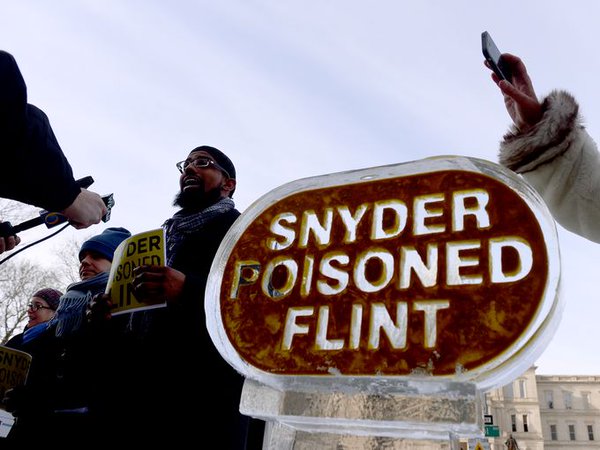
Flint, Michigan, once was the reality and the symbol of America’s industrial civilization. Now it is a grim warning of how our civilization can end—not destroyed by aliens or even by global warming—but destroyed by the greed and indifference of our elites and their neo-liberal policies that replace our public institutions.
What is civilization? It’s the assumed fabric that makes our lives safe—all the things we take for granted. That the water comes on when we turn the tap, and that it’s safe to drink. That the traffic lights work and that other drivers will obey them. That the police will come if we call 911, and that they will not extort money from us or shoot us (this is the power of the Black Lives Matter movement—it reveals how civilization is only present for some of us some of the time).
Here’s the trick though—civilization makes markets possible. Think about going to a farmers market. You only go because you are sure the food sold there is safe, the scales on which the food is weighed are honest, the change you are given for your purchase is not counterfeit.
At the heart of civilization is solidarity—people acting together in the common interest—people standing together to protect and support each other. Solidarity is what makes us human. And the broadening of solidarity—from the tribal band to humanity as a whole—is what makes civilization. Amid the Flint nightmare, we saw people, doctors serving the poor, scientists at a public university—Virginia Tech, who had never been to Flint—who exemplified civilization.
But if we turn civilization over to markets, we are on the fast track to decline. Turning civilization over to markets is what effectively happened in Flint—where the emergency manager, only asked one question about the water—where can we get the cheapest supply? Not "Is it safe?" but "Where can we get it cheap?"
In every corner of America, the same kind of thinking is leading us down the road to national decline. We are told we don’t need to invest in our nation’s infrastructure because markets will take care of it. After a generation of this kind of talk, and shrinking public investment, our nation’s infrastructure deficit, as measured by the American Society of Civil Engineers, is $3.6 trillion.
All across our nation’s heartland, the lead levels seen in Flint are not the exception, they are the rule. Our nation’s air traffic control system is a patchwork of software from the 1970s and 1980s. Our global competitors are years ahead of us in areas like high speed rail and universal broadband access and are fast becoming the suppliers of these key technologies to the world’s emerging economies.
In Flint, we see where neo-liberal policies lead. First to economic decline and poverty, then to an America where our kids can’t drink the water. If we want to live in a civilized society, it’s time we took on both our infrastructure deficit and our solidarity deficit.

